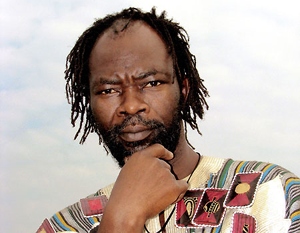Kwame Bediako
An interview with Kwame Bediako
by Max Ink Writer List
July 2014

Kwame Bediako
Kwame Bediako will fill the air with the sound of roots reggae music at Madison’s Atwood Fest on Saturday, July 26th.
Kwame has been performing “retro” roots reggae in America for over 20 years. His music holds true to a vintage style—something that’s becoming rare in the modern reggae world, where reggae-rock and dancehall tunes dominate the charts. Born and raised in Ghana, West Africa, Kwame has a global conscience and has seen different ways of life. “When I turned 21, I left,” he said, with a chuckle. Kwame came to the states for school, a common reason why young people from around the globe come here. Soon after, he found himself in the right place at the right time, surrounded by musical opportunities. “The next thing I know, I started gravitating more towards music,” said Kwame. “I’ve been doing it ever since, for about 20 or 30 years.”
Kwame currently lives in Chicago, but that’s not the only place where he’s lived and made music. Among the places he’s called home are Los Angeles, California, and New York. “We’ve been all over,” he said. In the beginning of his music career, Kwame lived in Los Angeles and called his full band Kwamikaze. Things changed and he ended up in Chicago, where he stuck around for his education. In Chicago, he found himself surrounded by many musicians and music influences. Between 2000-2013, he made music under his own name and released three studio albums. “One of the musicians from the original Kwamikaze band ended up living in the Madison area, so we got to talking again and we decided to bring back Kwamikaze,” said Kwame.
Kwame’s albums and performances are well-received by listeners who value true roots music. “We’re roots and culture, traditional,” said Kwame. “That’s what comes out of us, you know, we couldn’t do anything else. That’s what we are.” “In Ghana, I grew up on what you call highlife,” he explained. Highlife is similar to reggae, with a more complex rhythm. Reggae takes out of some of the beat elements and makes it simplified. “Reggae is very much a version of highlife,” said Kwame. “Highlife means high living.”
Reggae is a new genre, and it evolved to be the way it is today. The sound comes from a mix of political, economic, cultural, and geographic factors. African people were captured from their homeland and forced to slave on plantations in Jamaica. The country only gained its independence from the UK in 1962 (Ghana declared independence from the UK in 1957). Reggae has a unique one-drop rhythm, slowed down, island-sounding, and the music brings relevant cultural information to light. Kwame explained, “It was calypso first. Calypso started coming in, and then rocksteady like Desmond Dekker. Then Jimmy Cliff came down…and then rasta bust through, and everything changed.” Modern reggae music like Kwame’s is influenced from these traditional styles, and more. “You can feel a bit of every music in reggae, and that’s what the universal appeal of the music is,” he said.
At Atwood Fest, there will be six people in the Kwamikaze lineup. Drums, bass, keyboard, and 2-3 guitars.
Kwame’s 2013 album, Forward Ever, is a collection of inspiring songs, complete with a few dub versions. The album was remastered with help from big names in reggae, including Sidney Mills of Steel Pulse and the late Junior Marvin. “Those guys helped us out a lot along the way,” said Kwame. “You see what they do in the studio, and you’re like ‘Wow, ok, this style is good.’ So we’ve learned quite a bit from those guys. Sidney is a like a brother of mine.”
Kwame said a great person he’s shared the stage with is Tony Rebel, who he also considers a brother. “Tony gave me the opportunity to tour with him one time, when I was really down, and it was really a picker-up,” said Kwame. “I had just been shot, in the Chicago area, and I was going through some things. Then Tony came through, and we did a two-week tour on the west coast. It was really eye opening.”
Kwame was shot in the arm in 2004 during an attempted robbery. “If I hadn’t held the gun to redirect it, he would have put [the bullet] in my stomach,” Kwame said. “For a while, I lost my nerve [function] on my left arm, so I couldn’t play the guitar. And slowly it’s been coming back, although it’s still not all the way.” Kwame is a strong person inside and out—you can tell in his story and his music. “I’m hanging in there, sis,” he said with a laugh.
On his website, kwamereggae.com, you can hear some of his music, and you can also read Kwame’s original poetry. “I don’t know if that’s what you’d call poetry,” Kwame said, with a humble laugh. “It’s what’s in my head, and I’ve been doing it for a long time. Sometimes you think of funny things, and you try to put them down, and they come together like that. When you write music, sometimes you get writer’s block, so that’s where I can get some of the lyrics.” The poems are certainly his own unique style. “I learned from some of the best—Jim Morrison, Bob Dylan,” he said.
Slowly but surely, Kwame is working on a new album, and re-issuing his first two. He is looking forward to seeing the Madison massive again.
(2968) Page Views Kwame Bediako Online: